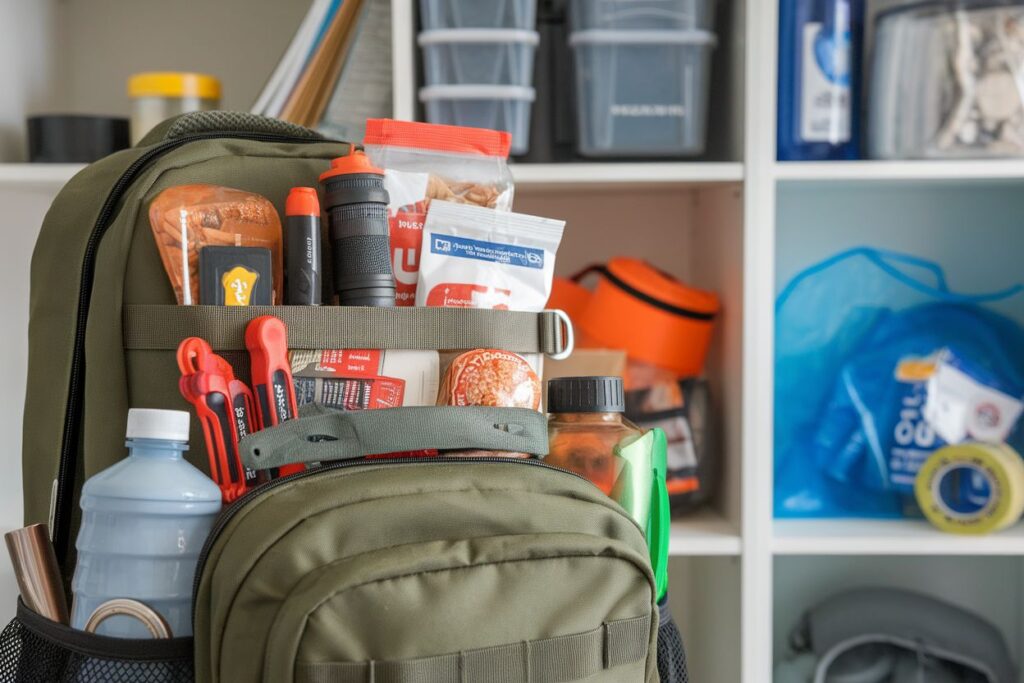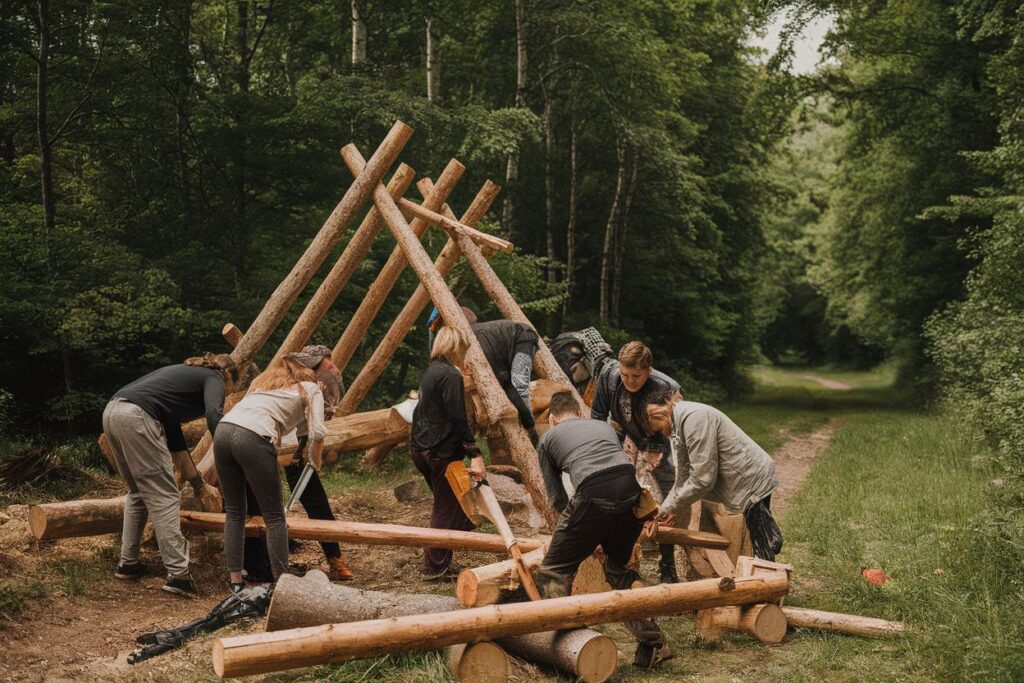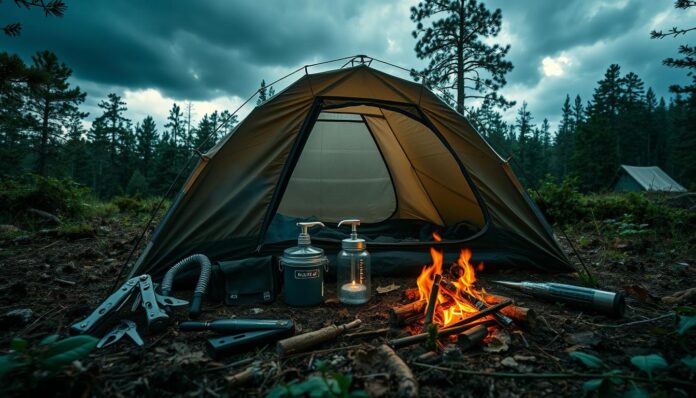Survival preparedness is key in our unpredictable world. Emergency situations can pop up without warning. SHTF preparedness is not just for extreme cases. It’s about keeping yourself and your loved ones safe during unexpected challenges.
Knowing how to survive disasters is crucial. These can be natural or caused by humans. Disaster readiness means learning strategic knowledge and skills. It also means having backup plans to stay calm and react well in stressful times.
Prepper tips are more than just stockpiling. They cover a wide range of safety and preparedness. This includes planning, skill building, managing resources, and staying mentally strong. Knowing the risks and preparing ahead can greatly boost your survival chances.
Today I will talk about detailed strategies for better emergency preparedness. You’ll learn how to face tough situations with confidence and smart planning.
Understanding SHTF Scenarios and Basic Preparedness
Getting ready for disaster scenarios needs a smart plan and a strong survival mindset. Emergencies can happen fast, making life hard. Good emergency planning starts with knowing the risks and having a solid plan to keep you and your family safe.
It’s key to assess risks to make a strong emergency plan. Different places face different dangers, like hurricanes, earthquakes, economic troubles, or civil unrest. Knowing these threats helps you make a plan that fits your area.
Common SHTF Situations to Prepare For
Experts say there are key disaster scenarios to plan for. These include bad weather, power outages, pandemics, and economic troubles. Each one needs its own plan to keep you safe and manage resources.
“Preparation is the key to survival. Knowledge and planning are more valuable than any single piece of equipment.” – Survival Expert
Initial Steps for Emergency Readiness
Starting a survival mindset means being practical. First, make a list of must-have items, learn basic survival skills, and set up ways to stay in touch with family. Stock up on water, food that won’t spoil, first aid, and ways to communicate in emergencies.
Creating an Emergency Response Plan
Your emergency plan should have escape routes, meeting spots, and backup ways to talk. Think about your family’s special needs, like medical stuff, age, and how to get around in emergencies.
Essential Survival Tips for Emergency Situations

Learning survival skills can be a lifesaver in emergencies. It’s not just about knowing what to do; it’s about practicing it. People who want to be self-reliant need to focus on key skills that help them handle tough situations.
“Survival is not about having the right equipment, but knowing how to use what you have effectively.” – Wilderness Survival Expert
Knowing how to start a fire is a basic survival skill. It’s important to learn different ways to start a fire, like using matches, ferro rods, and making fire with sticks. This skill is crucial for staying warm and cooking food when you’re in an emergency.
Building a shelter is also a key skill. It’s about using natural materials to protect yourself from the elements. Experts say it’s good to know how to make different types of shelters for different places and weather.
Being able to navigate is also vital. You should know how to read maps, use a compass, and navigate by the stars. Even though GPS devices are common, knowing how to navigate without them is important for true self-reliance.
Finally, knowing basic first aid is essential. It includes treating wounds, managing shock, and doing emergency medical procedures. This knowledge can save lives when you can’t get to a doctor.
Building and Maintaining Your Emergency Supply Kit
Creating a detailed emergency supplies kit is key for survival in unexpected situations. It needs careful planning and the right items to keep you and your family safe. These items should last through tough times.
A good survival kit is more than just gathering items. It’s about choosing the right resources for long-term storage. These resources are vital for support during emergencies.
Water and Food Storage Requirements
Water is the most important part of any emergency kit. Experts say you need at least one gallon per person per day for two weeks. Use containers that are safe for food and water, like plastic or metal, to avoid contamination.
“Preparedness is not about fear, but about intelligent planning for potential challenges.” – Emergency Preparedness Expert
Medical Supplies and First Aid Essentials
Your kit should have all the medical basics. Include prescription drugs, bandages, antiseptic wipes, pain relievers, and first aid tools. Check these supplies every year to keep them fresh and effective.
Tools and Equipment Checklist
Your kit should have multi-use tools like Swiss Army knives, flashlights, and radios. Don’t forget extra batteries and portable chargers. Also, include hand-crank or solar-powered devices for power and communication.
Regular checks and smart stockpiling turn your emergency supplies into a vital lifeline during crises.
Self-Defense and Security Measures During SHTF
Getting ready for emergencies means focusing on home security and personal safety. Knowing your surroundings is key when safety nets fail.
Learning self-defense starts with knowing your area. Home security is not just about walls. It’s about a smart defense plan. Experts say to have many layers, like strong doors, clear views, and ways to talk to others.
“Safety is not an accident, but a deliberate preparation strategy.” – Security Expert
Protecting yourself is more than fighting. Learning to calm down, spotting threats, and staying calm can save lives. Training in non-violent ways helps you handle conflicts better.
Important home security tips include:
– Keeping your area safe
– Having backup ways to talk
– Plans for emergencies
– Ways to defend yourself
– Basic self-defense skills
Being aware of your surroundings is crucial. This means watching out for dangers, knowing signs of threats, and having plans for different situations.
Off-Grid Living Skills and Resource Management

Surviving long-term emergencies requires off-grid living skills. Learning to be self-sufficient is key when normal services fail. Managing resources well is essential for a good quality of life in tough times.
Alternative Power Sources
Solar panels and portable wind generators are great for power. They let homes make their own electricity. Small solar setups can power important devices and lights when power is out.
Food Production and Preservation Methods
Planning is vital for growing food. Backyard gardens, hydroponics, and vertical farming use space well. Methods like dehydration, canning, and root cellaring keep food fresh longer, helping during hard times.
Water Collection and Purification Techniques
Water is crucial for survival. Systems like rainwater harvesting and underground cisterns are vital. Knowing how to purify water—like boiling or using filters—is essential for safe drinking in off-grid areas.
Final Thoughts
Emergency preparedness is more than a plan; it’s a vital skill for uncertain times. I gave you some great survival tips and a SHTF action plan. These help you get ready for emergencies.
Knowing what might happen and taking steps ahead can really help. You’ll be better equipped to face tough situations.
Your survival plan should always be ready to change. Keep learning, check your gear, and update your emergency plan often. Learning survival skills like first aid and self-defense is crucial.
Preparedness is a continuous journey. Begin by creating an emergency kit and learning survival skills. Stay updated on risks too. Knowledge, preparation, and a calm mind are your best allies in emergencies.
Survival readiness empowers you. By understanding risks and planning well, you turn uncertainty into readiness. Your efforts today could save you and your family tomorrow.











